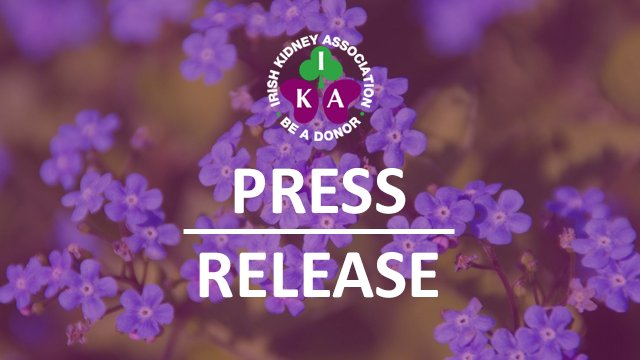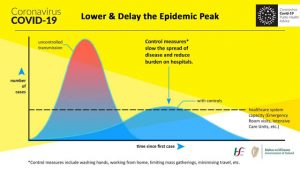STATEMENT 23rd February 2021
The Irish Kidney Association welcomes the government’s announcement (on 23 Feb. 2021) of changes to the Covid-19 vaccine allocation priority list. Moving all organ transplant recipients and people on dialysis aged 16-69 years old to cohort 4 is consistent with their medical risk as was originally indicated by their inclusion in the extremely vulnerable group in relation to cocooning. It is noteworthy that the age category was expanded from 18-65 years to 16-69 years to reflect the fact that one of the vaccines has been certified for use in this cohort.
The statistics in this area make for stark reading with Ireland and countries across Europe indicating a Covid-19 mortality rate of 20% amongst kidney transplant recipients and 25% amongst people on dialysis. This has brought the vulnerability of patients into stark focus and this has also brought huge anxiety to families and carers as they endeavour to keep their households going whilst their loved ones cocoon.
As governments around the world released their vaccine roll-out plans, the wider medical community spoke with one voice. The European Society for Organ Transplantation, the British Transplantation Society and the American Society of Nephrology all released statements urging governments to prioritise people on dialysis and transplant recipients. The International Society of Nephrology also wrote to the World Health Organisation asking that they use their network to raise awareness of the importance of vaccinating people on dialysis and transplant recipients. The HSE’s National Renal Office supported the position taken by these bodies as did the HSE’s Organ Donation Transplant Ireland.
The case for change was clear and unequivocal with the statistics and expert medical opinion supporting an increased priority. We welcome the revised priority list as it now reflects the true vulnerability of people on dialysis and transplant recipients. We stand ready to work with the HSE to facilitate any messaging and engagement relevant to this group. We would like to acknowledge the professionalism and dedication of all those involved in the care of people on dialysis and transplant recipients particularly during this pandemic. Their hard work and commitment has made a very challenging time a little easier to bear.
In response to the Covid-19 pandemic the Irish Kidney Association had to quickly adapt to face a new reality and ensure that we could continue to live up to our mission statement of supporting people living with and affected by end stage kidney disease under very changed circumstances.
The pandemic has been particularly challenging for people on dialysis and transplant recipients. Both categories of individuals have been identified as being in the extremely vulnerable group of the general population and consequently have spent most of the past 12 months cocooning.
The majority of people on dialysis in Ireland (approximately 2,200 people) have had to face coming out of their cocoon to attend haemodialysis sessions 3 times a week every week (156 times a year). This involved their transport to and from their dialysis unit and coming into close contact with fellow patients and staff during their 3-4 hours of treatment when they were there.
Solid organ transplant recipients (including Heart, Lung, Liver, Pancreas and Kidney) have been reminded of their vulnerability, despite having received the gift of life afforded to them by their respective organ donors. The use of immune-suppressants to protect their transplanted organ has put them at risk of severe consequences if they contract Covid-19.
Throughout, the Irish Kidney Association has been active behind the scenes communicating with the HSE’s National Renal Office and HSE’s Organ Donation Transplant Ireland as well as engaging with medical and patient organisations across Europe, and beyond, to ensure that we understood the true impact of the virus and were aware of best practice in relation to its management. It has been challenging, but also a real illustration of how patient organisations and the health service can work together for the betterment of patients and we hope this model of working together informs future working relationships. It was also pleasing to witness the coming together of 19 patient organisations under the banner of the Irish Platform for Patient Organisations, Science & Industry (IPPOSI) and we were pleased to be part of the alliance.
We are proud of how our members have rallied together to support each other and how family and friends have stepped forward to help the more vulnerable members of society. The Irish spirit of Meitheal lives on.
-ENDS-
For further information contact:
Carol Moore, Chief Executive, IKA tel. 085 8770678
Colin White, National Projects Manager, IKA tel 087 6843644
Gwen O’Donoghue, Media & communications, IKA tel. 086 8241447
A New Cohort 4 includes
Those aged 16-69 with Chronic kidney disease, on dialysis, or eGFR <15 ml/min
Severe immunocompromise due to disease or treatment e.g. Transplantation or – Listed for solid organ or haematopoietic stem cell transplant (HSCT) – Post solid organ transplant at any time –
Revised Cohort 7
Those aged 16-64 and at high risk of severe COVID-19 disease
This includes Chronic kidney disease with eGFR <30ml/min
For full details of the revised priorities, click on this link.
What is eGFR?
eGFR – Estimated glomerular filtration rate is the best test to measure your level of kidney function and determine your stage of kidney disease. Your doctor can calculate it from the results of your blood creatinine test, your age, body size and gender.




